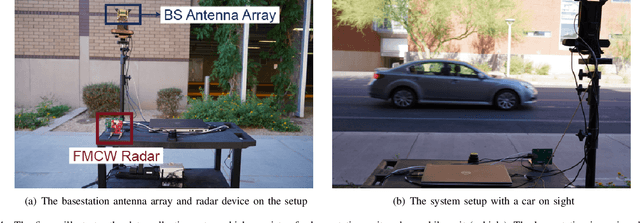Radar Aided 6G Beam Prediction: Deep Learning Algorithms and Real-World Demonstration
Paper and Code
Nov 18, 2021



This paper presents the first machine learning based real-world demonstration for radar-aided beam prediction in a practical vehicular communication scenario. Leveraging radar sensory data at the communication terminals provides important awareness about the transmitter/receiver locations and the surrounding environment. This awareness could be utilized to reduce or even eliminate the beam training overhead in millimeter wave (mmWave) and sub-terahertz (THz) MIMO communication systems, which enables a wide range of highly-mobile low-latency applications. In this paper, we develop deep learning based radar-aided beam prediction approaches for mmWave/sub-THz systems. The developed solutions leverage domain knowledge for radar signal processing to extract the relevant features fed to the learning models. This optimizes their performance, complexity, and inference time. The proposed radar-aided beam prediction solutions are evaluated using the large-scale real-world dataset DeepSense 6G, which comprises co-existing mmWave beam training and radar measurements. In addition to completely eliminating the radar/communication calibration overhead, the experimental results showed that the proposed algorithms are able to achieve around $90\%$ top-5 beam prediction accuracy while saving $93\%$ of the beam training overhead. This highlights a promising direction for addressing the beam management overhead challenges in mmWave/THz communication systems.
 Add to Chrome
Add to Chrome Add to Firefox
Add to Firefox Add to Edge
Add to Edge